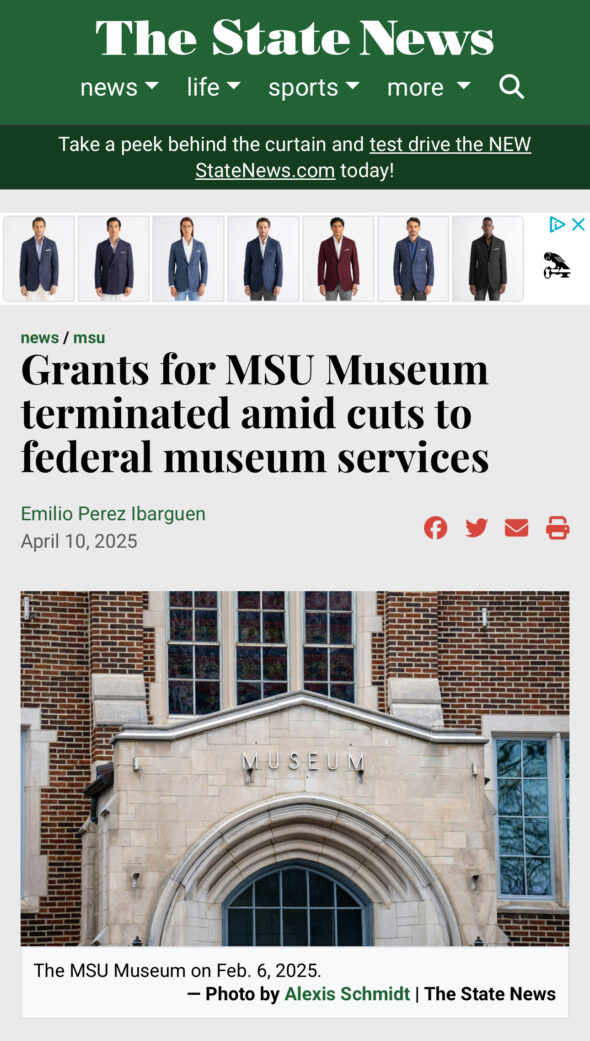On March 14, President Trump signed an executive order, Continuing the Reduction of the Federal Bureaucracy, which called for the “reduction in the elements of the Federal bureaucracy that the President has determined are unnecessary.” Among the agencies targeted by this order was the Institute of Museum and Library Services (IMLS). I previously shared some reflections on this executive order and its potential impact on IMLS and its service to the museum field. Since then, much more has unfolded.
To date, the IMLS advisory board — the National Museum and Library Services Board, composed of experts from both the museum and library professions — has been dissolved. Furthermore, the majority of the staff have been placed on administrative leave, and Deputy Secretary of Labor Keith E. Sonderling has been sworn in as Acting Director of IMLS. In addition, IMLS has been sending letters to institutions nationwide, announcing the termination of active grant awards.

This week, the MSU Museum was among those notified that our two active grants have been terminated. One of these grants was already nearing its expiration, but we still have approximately $70,000 in outstanding expenses that would have been covered. This particular grant aimed to “improve the care and management of over 2,000 vertebrate specimens, including rare, endangered, threatened, and extinct species.”

The second grant supported a two-year project designed to “improve the quality of visitor experiences at the MSU Museum, particularly for those with visual impairments, by training museum staff to assess spaces for accessible pathways and developing high-quality audio descriptions for interpretive and educational use.” This initiative built upon prior collaboration with the Smithsonian Institution, and we had hoped to advance it in ways that could serve as a replicable model across the field. With the termination of this award, we now risk being left with an additional $60,000 in unreimbursed expenses. We are currently awaiting clarification on whether the government will honor existing contracts and reimburse us for these costs.

It is becoming increasingly clear that the future of IMLS is in jeopardy. The loss of this agency will have profound effects on the field. For example, in terms of funding alone, the MSU Museum has received 26 grant awards totaling nearly $2.5 million since IMLS was established in 1996. Much of this support has directly advanced the care and stewardship of our collections. The vertebrate collection mentioned earlier contributed to over 150 scholarly articles last year and is extensively used in campus coursework. This underscores the vital role that collections care plays in teaching, research, and public engagement.
However, IMLS’ impact extends well beyond direct funding for individual institutions. In addition to supporting projects like those at the MSU Museum, the agency provides critical leadership and field-wide advancement. Notably, the National Leadership Grants for Museums and Libraries program supports “projects that address critical needs within the museum field and have the potential to advance professional practice and strengthen museum services for the American public.” I have previously served as a panel reviewer for this program and can say with confidence that many of the funded initiatives have had far-reaching impacts, demonstrating how an idea seeded at one institution can grow to benefit the broader community.
Over the past year, I have served as a professional consultant for two such projects. One was the Addressing the Silences initiative, led by the International Coalition of Sites of Conscience. I also supported the Council of American Jewish Museums (CAJM), in partnership with IMLS, on a program aligned with the Biden administration’s National Strategy to Counter Antisemitism. I had the privilege of serving as a program advisor, facilitator, and panelist for the IMLS and CAJM summit, Museums Respond: Strategies for Countering Antisemitism and Hate, held in Washington, DC in March 2024. This important work culminated in the publication of the Museums Respond: Strategies for Countering Antisemitism & Hate Field Guide to Resources.
Both projects serve as models for how museums can address pressing societal challenges and play a central role in healing our communities. Importantly, they produced tangible resources, such as toolkits and field guides, to help address antisemitism and other forms of hate.
From funding to town halls, research to policy support, IMLS advances museums and libraries in profound and lasting ways. Despite having fewer than 100 staff members and an annual budget of under $300 million — less than one-tenth of one percent of the federal budget — the impact of this agency is enormous. Its potential dissolution represents a significant loss for the field.
I have been sharing my perspectives on the implications for IMLS through various media outlets. This includes an interview with The Conversation, “a nonprofit, independent news organization dedicated to unlocking the knowledge of experts for the public good.” That interview was syndicated and featured in over 25 outlets nationwide, including Fast Company and PBS News.

Additionally, I returned to Stateside, a signature program of Michigan Radio, to discuss the issue with host April Baer. I also spoke with David Leins, Senior Producer of The Metro on WDET, Detroit’s NPR affiliate, about the executive order’s impact on IMLS — an interview that took place just before we were notified of the termination of our two grants.
Stateside: Monday, March 24, 2025 (Michigan Public)
The Metro: Wednesday, April 9, 2025 (WDET-FM)
Most recently, The State News, Michigan State University’s student newspaper, published an article featuring my insights on IMLS and its uncertain future.

Many people are unaware of the crucial work carried out by this small yet mighty agency. I firmly believe that as more people learn about IMLS’s modest size and its vast impact on communities nationwide, greater public support will emerge to preserve and continue the vital work of this agency.